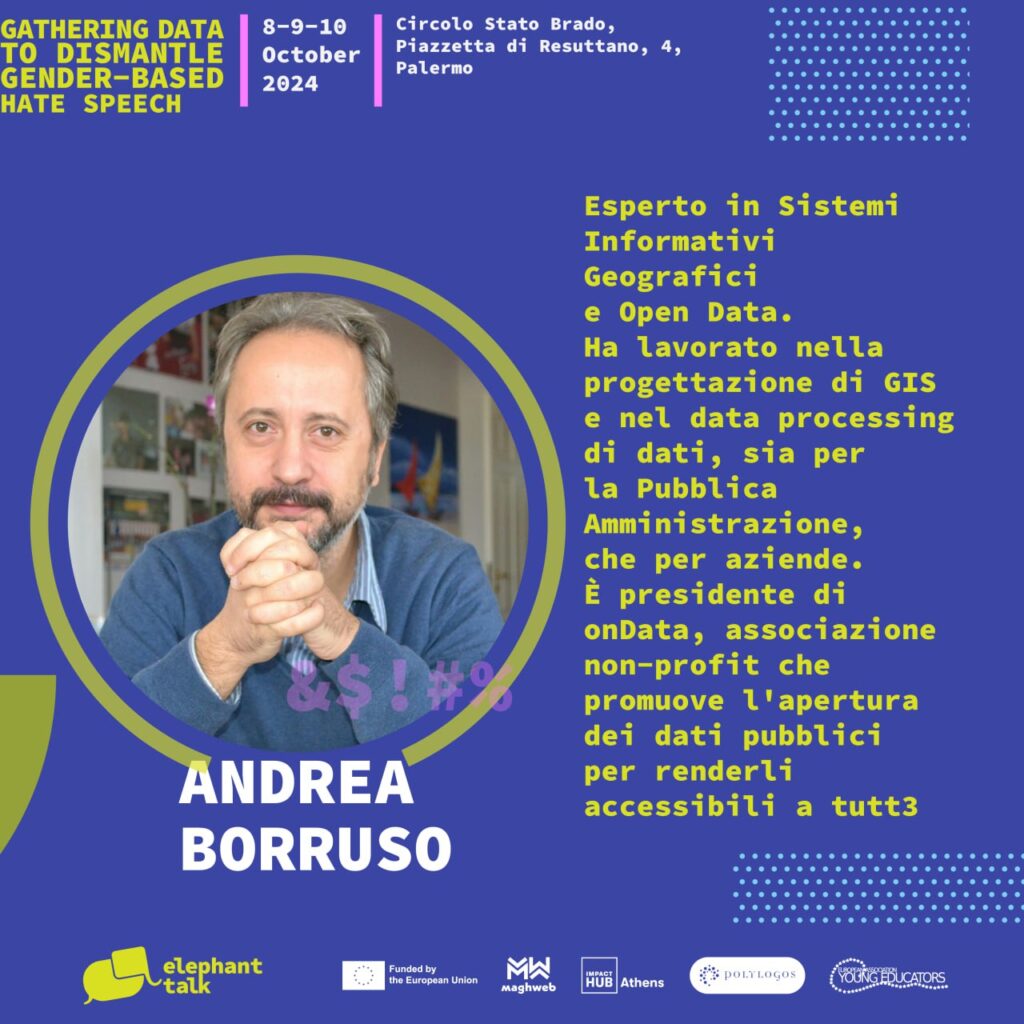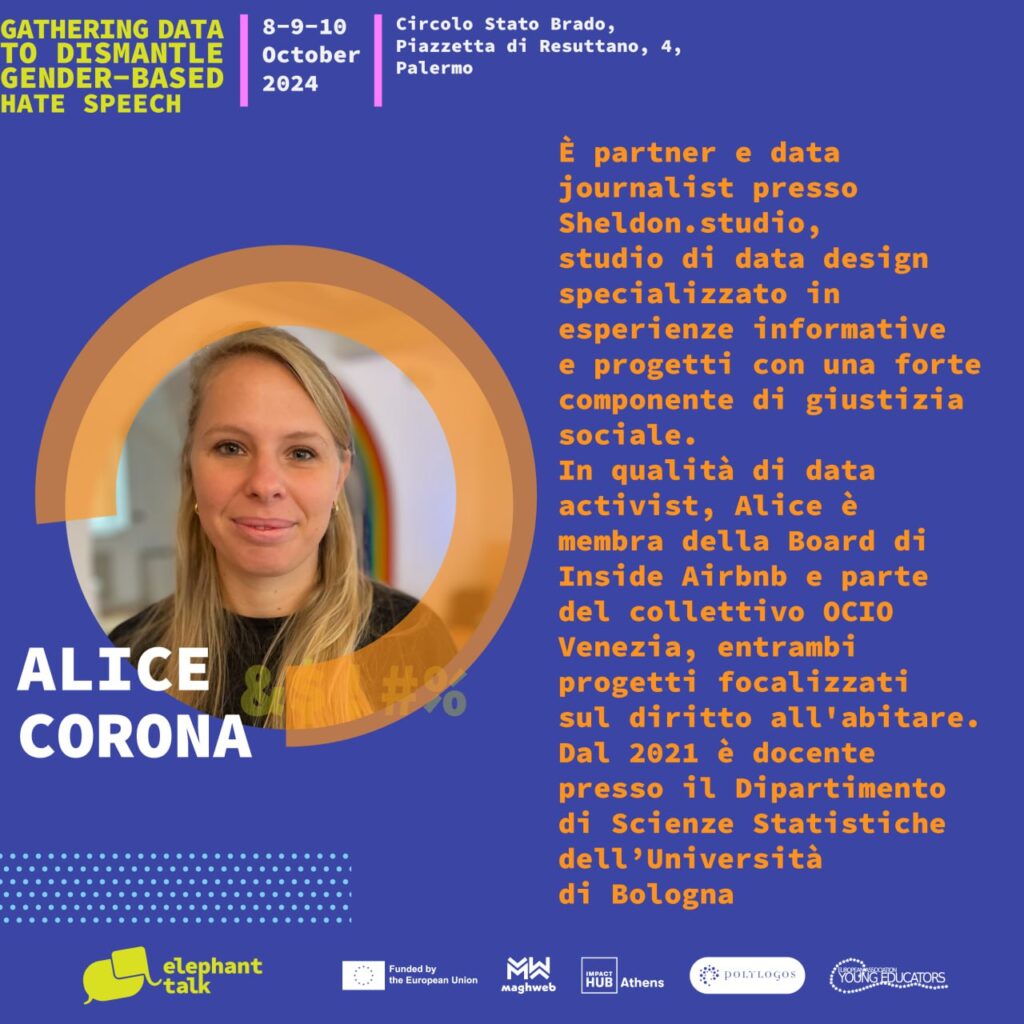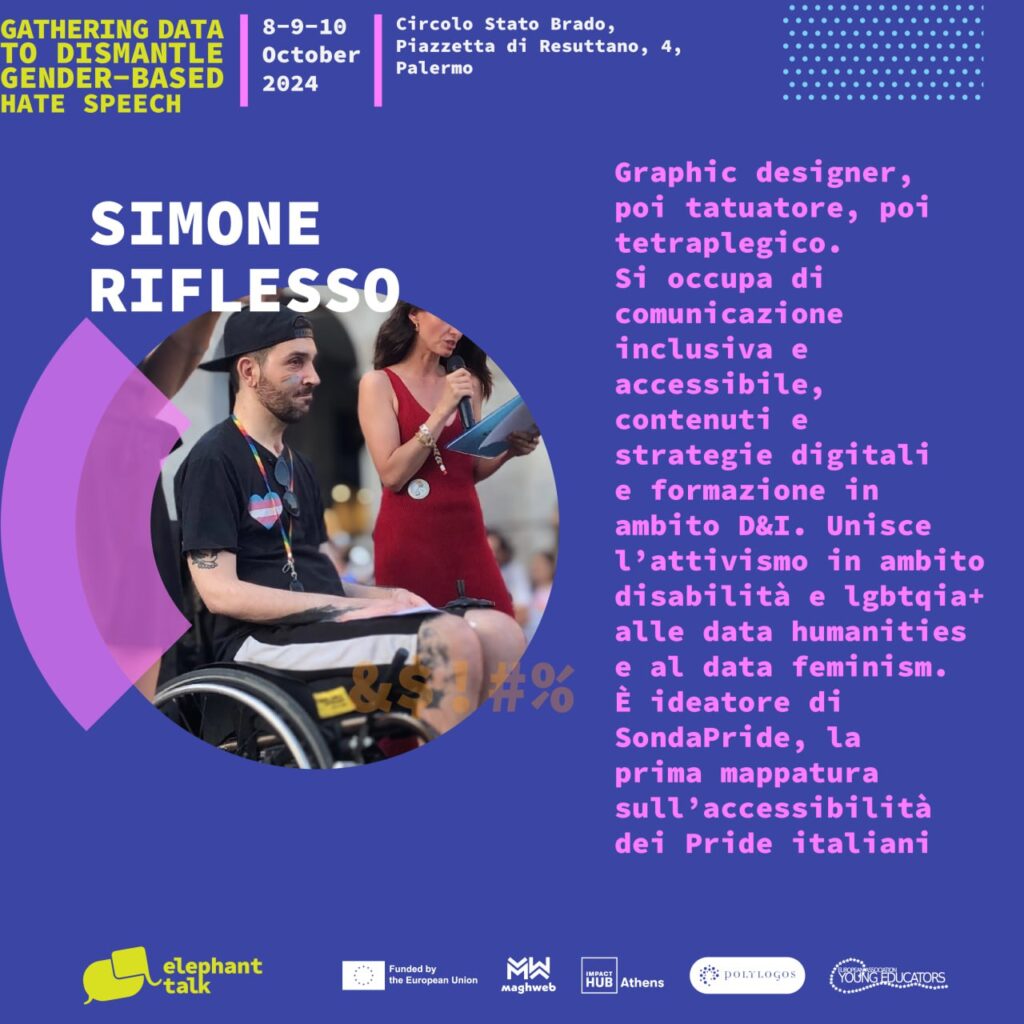I dati, la loro raccolta e rappresentazione possono essere uno strumento di trasformazione sociale e di sensibilizzazione?
Ne parleremo insieme ad Andrea Borruso, Alice Corona e Simone Riflesso, che dall’8 al 10 ottobre ci guideranno in un percorso di formazione che a Palermo riunirà animator3 socio-educativ3 e staff di organizzazioni europee che lavorano con giovan3.
Per tre giornate impareremo a raccogliere i dati in chiave transfemminista e intersezionale, e a utilizzarli come strumenti di consapevolezza, advocacy ed educazione; conosceremo inoltre progetti di raccolta dati dal basso e buone pratiche di attivismo digitale.
L3 youth worker, tutt3 provenienti da Italia, Croazia, Romania, Portogallo, Grecia, Slovenia e Spagna, utilizzeranno poi le capacità acquisite per portare avanti un’azione internazionale e collaborativa di raccolta e visualizzazione dati sul fenomeno sistemico dell’odio di genere online, coinvolgendo altr3 giovan3 nei propri contesti culturali.
I discorsi d’odio legati al genere online sono una forma di violenza che prende di mira le persone a causa del loro genere o della loro identità di genere, sminuendo, intimidendo o silenziando le loro voci, specialmente quando partecipano a spazi pubblici digitali o discutono temi legati al transfemminismo, ai diritti umani o alla politica. Una forma di odio digitale rivolto a donne, ragazze e persone non binarie o transgender, che può colpire anche uomini che non si conformano a certi stereotipi tradizionali di mascolinità.
Le piattaforme online e gli spazi digitali che abitiamo, pur essendo luoghi di libertà espressiva, non sono neutri, riflettono e spesso amplificano dinamiche di potere esistenti, e in generale i problemi più ampi della nostra società legati alla disuguaglianza di genere e al sessismo radicato e sistemico.
Elephant Talk è un progetto ideato da Maghweb in collaborazione con Impact Hub Labs, Polylogos e Young Educators e finanziato dall’EACEA nell’ambito del programma CERV, linea Coinvolgimento e partecipazione dei cittadini.
Can data, data gathering and data visualisation become tools for social transformations and consciousness raising?
We’ll be discussing this with Andrea Borruso, Alice Corona and Simone Riflesso from 8-10 October, as they guide us through a training session with youth workers and third sector workers from organisations across Europe.
For three days we’ll learn how to gather data from a transfeminist, intersectional perspective and use data as a tool for consciousness-raising, advocacy and education. We’ll also get to know grassroots data gathering projects and good digital activism practices.
The youth workers, gathering in Palermo from Italy, Croatia, Romania, Portugal, Greece, Slovenia and Spain will then use their new skills to carry out a collective, international data gathering and visualisation action against online gender-based hate speech, in collaboration with young people from their various cultural contexts.
Gender-based hate speech is a form of violence that targets people on the basis of their genders or gender identities, undermining, intimidating or silencing their voices, especially when they participate in public digital spaces or share their thoughts about issues linked to transfemminism, human rights or politics. It’s a form of digital hatred that targets women, girls, non-binary and transgender people, as well as men who do not conform to traditional masculine gender stereotypes.
Despite being sites of free expression, online platforms and the digital spaces we inhabit are not neutral: they reflect and often amplify power pre-existent power dynamics and wider societal problems linked to gender inequality and systemic sexism.
Elephant Talk is a youth active citizenship project created by Maghweb in collaboration with Impact Hub Labs, Polylogos and Young Educators funded by the EACEA in the CERV programme, Citizen’s Engagement and Participation strand.

Expert in Geographical Information Systems and Open Data. Has worked in the planning of GIS and in data processing for both the public sector and businesses.
President of onData, a non-profit organisation that advocates for the accessibility of public data.

Partner and data journalist at Sheldon.studio, a data design studio that specialises in informative experiences and social justice projects. As a data activist, Alice is involved in housing rights projects and a member of both the Inside Airbnb Board and the OCIO Venezia collective. Since 2021 she has been teaching at the Scientific Statistics Department at the University of Bologna.

Graphic designer, tattoo artist, quadriplegic. Works in accessible and inclusive communication, digital content, strategies and training in diversity and inclusion. Unites disability and LGBTQIA+ activism with data humanities and data feminism. Creator of SondaPride, the first accessibility map for Italy’s pride parades.

Funded by the European Union. Views and opinions expressed are however those of the author(s) only and do not necessarily reflect those of the European Union or the European Education and Culture Executive Agency (EACEA). Neither the European Union nor EACEA can be held responsible for them.




